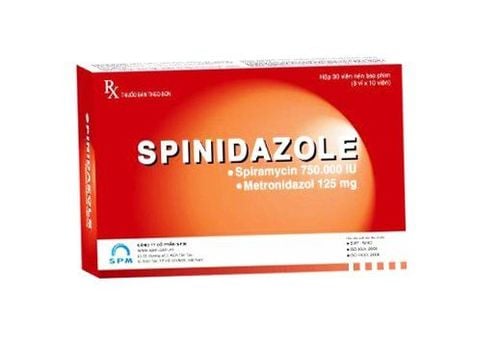This is an automatically translated article.
Ipadox Capsule is a drug belonging to the group of antibiotics used to treat infections such as pneumonia, respiratory tract, urinary tract, skin and soft tissue infections. The drug is prepared in the form of hard capsules with the composition of Doxycyclin hyclat 100 mg. To better understand the uses and doses of Ipadox Capsule, refer to the article below.
1. What is Ipadox Capsule?
Ipadox Capsule is an antibiotic with the main ingredient is Doxycylin, used in the treatment of respiratory, urinary, and skin infections.
Doxycylin antibiotic in Ipadox Capsule is an antibiotic of the tetracycline group, synthesized from oxytetracycline. This is one of the antibiotics with a broad spectrum of antibacterial and bacteriostatic effects.
2. Effects of Ipadox Capsule
With a broad antibacterial spectrum, Ipadox Capsule is effective against both Gram-positive and Gram-negative aerobic and anaerobic bacteria. Therefore, Ipadox Capsule is used to treat common infections.
2.1.Pharmacokinetics of Ipadox Capsule The drug is absorbed almost entirely from the gastrointestinal tract. 80-95% of Ipadox Capsule in the blood is bound to plasma proteins. After binding to plasma, Doxycycline in Ipadox Capsule distributes into tissues and secretions such as urine and prostate. Doxycycline normally accumulates in the spleen, bone marrow, and reticulocytes in the liver.
The elimination time of Doxycycline in Ipadox Capsule will be from 12-24 hours, the usual route of elimination is via feces and urine. Thanks to this route of elimination, Ipadox Capsule is safe to use in the treatment of infections in patients with renal failure and for the treatment of urinary tract infections.
2.2 Indications for use of Ipadox Capsule Respiratory tract infections: Pneumonia caused by bacteria Chlamydia pneumoniae, Mycoplasma pneumoniae. Patients with chronic bronchitis, sinusitis. In addition, lower respiratory tract infections caused by susceptible strains of Streptococcus pneumoniae, Haemophilus influenzae, Klebsiella pneumoniae and others.
Urinary tract infections: Bacterial infections caused by strains of Klebsiella, Enterobacter Spp,.... Nonspecific urethritis caused by strains of Ureaplasma urealyticum.
Sexually transmitted infections: gonorrhea, syphilis, endometrial and anal infections, uncomplicated urethral infections, urethritis.
This is an antibiotic of the tetracycline group, so Ipadox Capsule is also used to treat infections that respond to this group of antibiotics, specifically as follows
Skin and soft tissue infections: impetigo, boils , cellulitis and skin abscesses, wound infections, periungitis caused by Staphylococcus aureus and albus strains. Streptococcus, Trachoma due to bacterial standards sensitive to Gonococcus, Staphylococcus and Haemophilus influenzae. Rocky Mountain typhus, Coxiella endocarditis, and tick fever. Treatment of cholera, Melioidosis, Leptospira infection, falciparum malaria. Prophylaxis of malaria in areas with parasite strains. Treatment of periodontitis Treatment of anthrax caused by Bacillus anthracis
3. Contraindications to using Ipadox Capsule
Do not use Ipadox Capsule in combination with retinoids
Do not use Ipadox Capsule in children under 8 years old
For patients with a history of hypersensitivity, allergic reactions to tetracyclines, absolutely do not use Ipadox Capsule.
4. Dosage of Ipadox Capsule
As recommended by pharmacists and doctors, the best time to take Ipadox Capsule is after meals. Take the medicine in a standing or sitting position with a full glass of water.
Adults: For the effective treatment of bacterial infections, the single dose of attack against bacteria will be 2 tablets in the first day. Then, take one pill each day at the same time on the first day. If the infection is severe, the dose may be increased to 1 tablet every 12 hours. Children over 8 years old: 4mg/kg/day. In the treatment of Streptococcus infections: 10 days to prevent fever and glomerulonephritis In the treatment of acute gonorrhea: 3 tablets in the first day, including 2 tablets at the beginning and 1 tablet at night before going to bed. After the first dose, 2 tablets / day taken in the morning and afternoon, continuously for 3 days. In the treatment of uncomplicated urethral infections, endometrial infections: 1 tablet/time, 2 times a day, the drug duration is 10 days. Ipadox Capsule will be less effective if the patient takes it with antacids containing aluminum, calcium or magnesium. In addition, when co-administered with barbiturates, phenytoin and carbamazepine also reduce the half-life of Ipadox Capsule.
5. Ipadox Capsule side effects
The reported side effects currently on Ipadox Capsule are nausea, gastrointestinal disturbances, vomiting and diarrhea. When experiencing these symptoms, inform your doctor to assess the seriousness of your condition and consult your doctor to know if you should stop taking Ipadox Capsule.
In cases of rare side effects, the symptom is esophageal ulceration, if this condition is encountered, the drug should be stopped.
As one of the antibiotic lines to treat common bacterial infections today, Ipadox has been recorded in terms of quite significant effectiveness. Ipadox Capsule Tablets are available for prescription only and under the supervision of a physician.
Please dial HOTLINE for more information or register for an appointment HERE. Download MyVinmec app to make appointments faster and to manage your bookings easily.













